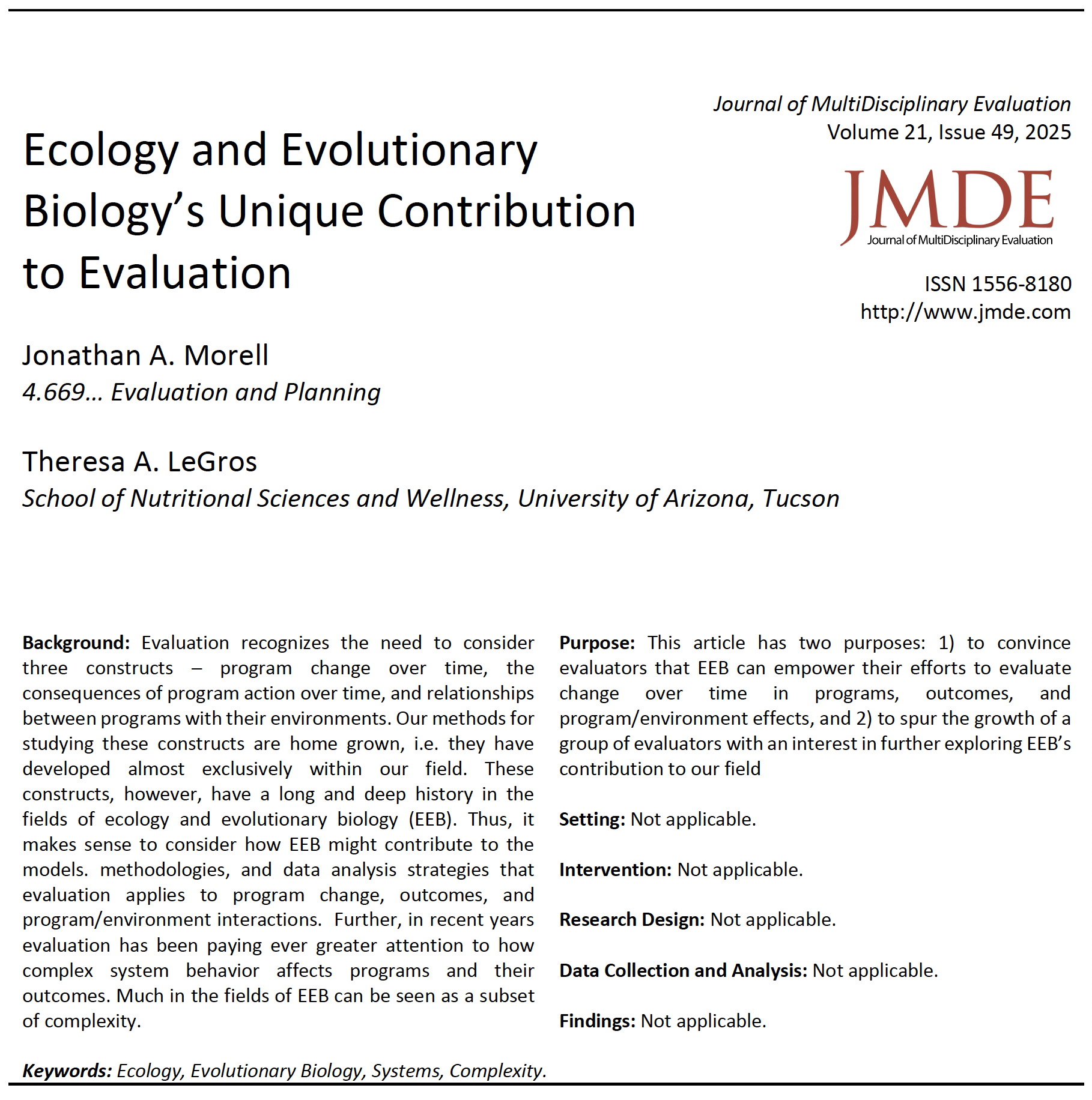Ecology and Evolutionary Biology’s Unique Contribution to Evaluation
Main Article Content
Abstract
Background: Evaluation recognizes the need to consider three constructs – program change over time, the consequences of program action over time, and relationships between programs with their environments. Our methods for studying these constructs are home grown, i.e. they have developed almost exclusively within our field. These constructs, however, have a long and deep history in the fields of ecology and evolutionary biology (EEB). Thus it makes sense to consider how EEB might contribute to the models. methodologies, and data analysis strategies that evaluation applies to program change, outcomes, and program/environment interactions. Further, in recent years evaluation has been paying ever greater attention to how complex system behavior affects programs and their outcomes. Much in the fields of EEB can be seen as a subset of complexity.
Purpose: This article has two purposes: 1) to convince evaluators that EEB can empower their efforts to evaluate change over time in programs, outcomes, and program/environment effects, and 2) to spur the growth of a group of evaluators with an interest in further exploring EEB’s contribution to our field
Setting: Not applicable.
Intervention: Not applicable.
Research Design: Not applicable.
Data Collection and Analysis: Not applicable.
Findings: Not applicable.
Downloads
Article Details

This work is licensed under a Creative Commons Attribution-NonCommercial 4.0 International License.
Copyright and Permissions
Authors retain full copyright for articles published in JMDE. JMDE publishes under a Creative Commons Attribution-NonCommercial 4.0 International License (CC BY - NC 4.0). Users are allowed to copy, distribute, and transmit the work in any medium or format for noncommercial purposes, provided that the original authors and source are credited accurately and appropriately. Only the original authors may distribute the article for commercial or compensatory purposes. To view a copy of this license, visit creativecommons.org
References
Balakrishnan, P. V., & Jacob, V. S. (1996). Genetic algorithms for product design. Management Science, 42(8), 1105-1117. https://doi.org/10.1287/mnsc.42.8.1105
Basalla, G. (1988). The evolution of technology. Cambridge University Press. https://doi.org/10.1017/S0007087400044939
Bass, E. E., & Krupp, A. S. (Eds.). (2010). Equity, social determinants and public health programmes. World Health Organization. https://www.who.int/publications/i/item/9789241563970.
Better Evaluation. (2023). Evaluative Thinking. Better Evaluation. https://www.betterevaluation.org/tools-resources/evaluative-thinking
Boehm, B., & Egyed, A. (1999). Optimizing software product integrity through life-cycle process integration. Computer Standards & Interfaces, 21, 63-75. https://doi.org/10.1016/S0920-5489(99)00005-7
Bradie, M., & Harms, W. (2020a). Evolutionary epistemology. In E. N. Zalta (Ed.), Stanford encyclopedia of philosophy. https://plato.stanford.edu/archives/spr2020/entries/epistemology-evolutionary/
Bradie, M., & Harms, W. (2020b). Evolutionary epistemology. In E. N. Zalta (Ed.), Stanford encyclopedia of philosophy. https://plato.stanford.edu/archives/spr2020/entries/epistemology-evolutionary/
Bradie, M., & Harms, W. (2023). Evolutionary epistemology. In E. N. Zalta & U. Nodelman (Eds.), Stanford encyclopedia of philosophy https://plato.stanford.edu/entries/epistemology-evolutionary/
Campbell, D. T. (1960). Blind variation and selective retentions in creative thought as in other knowledge processes. Psychological Review, 67(6), 380-400. https://doi.org/10.1037/h0040373
Carmichael, T., & Hadžikadić, M. (2019). The fundamentals of complex adaptive systems. In T. Carmichael, A. J. Collins, & M. Hadžikadić (Eds.), Complex adaptive systems: Views from the physical, natural, and social sciences (pp. 1-16). Springer International Publishing. https://doi.org/10.1007/978-3-030-20309-2_1
Collins, J. P. (1986). Evolutionary ecology and the use of natural selection in ecological theory. Journal of the History of Biology, 19(2), 257-288. https://doi.org/10.1007/BF00138879
Davies, R. (1998). Order and diversity: Representing and assisting organisational learning in non-government aid organisations. [Doctoral dissertation, University of Wales Swansea]. http://www.mande.co.uk/wp-content/uploads/1998/Davies-R-1998-PhD-Thesis.pdf
Davies, R. (2010). Do we need a required level of failure (RLF)? https://mandenews.blogspot.com/2010/10/do-we-need-minimal-level-of-failure-mlf.html
Davies, R. (2020). ParEvo⎯a planning tool. https://mscinnovations.wordpress.com/
Golden, S. D., & Earp, J. A. L. (2012). Social ecological approaches to individuals and their contexts: Twenty years of health education & behavior health promotion interventions. Health Education & Behavior, 39(3), 364-372. https://doi.org/10.1177/1090198111418634
Hannan, M. T., & Freeman, J. (1989). Organizational ecology. Harvard University Press. https://doi.org/10.4159/9780674038288
Heltne, P. (1998). Basic concepts of ecology and evolutionary biology. Hastings Center Report, 28(6), s12-s22. https://doi.org/10.2307/3528275
LeGros, T., Jacobs, L., Bhakta, A., & Orzech, K. (2024). AZ Health Zone FY23 annual evaluation report: Reflecting community through the SNAP-Ed Window [pages 18-23]. https://nutritioneval.arizona.edu/sites/nutritioneval.arizona.edu/files/materials/0%20FY23%20Annual%20Evaluation%20Report%20v1.0.pdf
McPeek, M. A, & McPeek, T. E. (1996). Evolutionary biology and community ecology. Ecology, 77(5), 1319-1320. https://doi.org/10.2307/2265528
Morell, J. A. (2024). Early childhood development action network Master class in systems thinking: Complex system behaviors that can help us plan and evaluate. https://evaluationuncertainty.com/2024/04/23/early-childhood-development-action-network-master-class-in-systems-thinking-complex-system-behaviors-that-can-help-us-plan-and-evaluate/
Morell, J. A., LeGros T., & Joseph, J. (2024). More powerful evaluation by linking systems thinking with ecology and evolutionary biology. https://evaluationuncertainty.com/2024/01/18/more-powerful-evaluation-by-linking-systems-thinking-with-ecology-and-evolutionary-biology/
Parunak, H. V. D., Savit, R., & Riolo, R. L. (1998). Agent-based modeling vs. equation-based modeling: A case study and users' guide. Proceedings of Multi-Agent Systems and Agent-Based Simulation (MABS'98), LNAI 1534, 10-25. https://doi.org/10.1007/10692956_2
Pastor, J. (2017). Ecosystem ecology and evolutionary biology, a new frontier for experiments and models. Ecosystems, 20(2), 245-252. https://doi.org/10.1007/s10021-016-0069-9
Picciotto, R. (2019). Donald T. Campbell's evolutionary perspective and its implications for evaluation. Journal of MultiDisciplinary Evaluation, 15(33), 1-15. https://doi.org/10.56645/jmde.v15i33.553
Preiser, R., Biggs, R., De Vos, A., & Folke, C. (2018). Social-ecological systems as complex adaptive systems organizing principles for advancing research methods and approaches. Ecology and Society, 23(4). https://www.jstor.org/stable/26796889
Rice, R. E., & Rogers, E. M. (1980). Reinvention in the innovation process. Knowledge, 1(4), 499-514. https://doi.org/10.1177/107554708000100402
Uhl-Bien, M., Marion, R., & McKelvey, B. (2007). Complexity leadership theory: Shifting leadership from the industrial age to the knowledge era. The Leadership Quarterly, 18(4), 298-318. https://doi.org/DOI:10.1016/j.leaqua.2007.04.002
Urban, J. B., Hargraves, M., & Trochim, W. M. (2014). Evolutionary evaluation: Implications for evaluators, researchers, practitioners, funders and the evidence-based program mandate. Evaluation and Program Planning, 45, 127-139. https://doi.org/10.1016/j.evalprogplan.2014.03.011
West, G. (2017). Scale: The Universal Laws of Growth, Innovation, Sustainability, and the Pace of Life in Organisms, Cities, Economies, and Companies. Penguin.
Williams, B., & Imam, I. (2007). Systems concepts in evaluation. EdgePress of Inverness.

